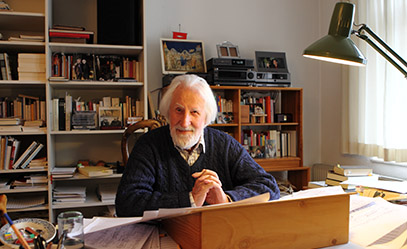 |
Fluctuat nec Mergitur
Declined in Zürich, Cambridge and Paris, the Von Zeit zu Zeit project – which coincides with the in October release of a new CD dedicated to Swiss composer Klaus Huber, the culmination of the centenary of his birth celebrated throughout the previous season – aims to explore the musical identity of a neighbour, so close, yet so distant: Switzerland, whose contemporary music embodies a fruitful dialogue between modernity and heritage.
It covers a wide field of creation that is not defined by a single school, but by a broad and varied spectrum where atonalism, spectralism, micro-intervals, minimalism and new electroacoustic writing coexist, as evidenced by the highly varied aesthetics of the works included in the programme.
Featured in the same pantheon of musical creation and now constituting landmarks of a time that illuminates our present, Pierre Boulez and Luciano Berio structure the recital given at King's College Cambridge. Building on this powerful legacy, the creations of Philippe Racine are followed by those of Ricardo Nillni, Aurélien Dumont and Augustin Braud, whose common source of inspiration is philosophy.
Presented in the redesigned setting of the salon, which encourages closer contact with the audience, they will be put into perspective by a round-table led by Yannick Mercoyrol, in which contemporary composers and philosophers will exchange views on how philosophical concepts can interact with today's music: either structurally with the seven aphorisms of Wittgenstein's Tractatus ogico-philosophicus inspiring Ricardo Nillni's Sept figures de l'indicible or conceptually with Georges Didi-Hubermann's question of anachronism prompting Augustin Braud to explore how to represent survival in music, or through Aurélien Dumont's use of the concept of Dé-coïncidence developed by François Jullien.
It is also in the form of a discussion forum at Rens Lispsius' Artist House that we are offering a revised version of the programme from our tour of Morocco last December, which, from Boulez to Mâche, via Kevin Volans and Ligeti, brilliantly demonstrates the open-mindedness and curiosity of our contemporary composers to draw inspiration from other cultures without ever renouncing their own, backed by a thousand-year-old tradition of thought and writing.
The death of effort is the end of thought,’ emphasised the philosopher Alain. Whether musical or philosophical, it clearly has not had its final say. We invite you to share in this joyful effort made bythose who conceive it and those who are responsible for revealing it.
In a global context that is deleterious and mediocre to say the least, your active presence helps to give it meaning, strength and legitimacy.
Jean-Luc Menet

 |